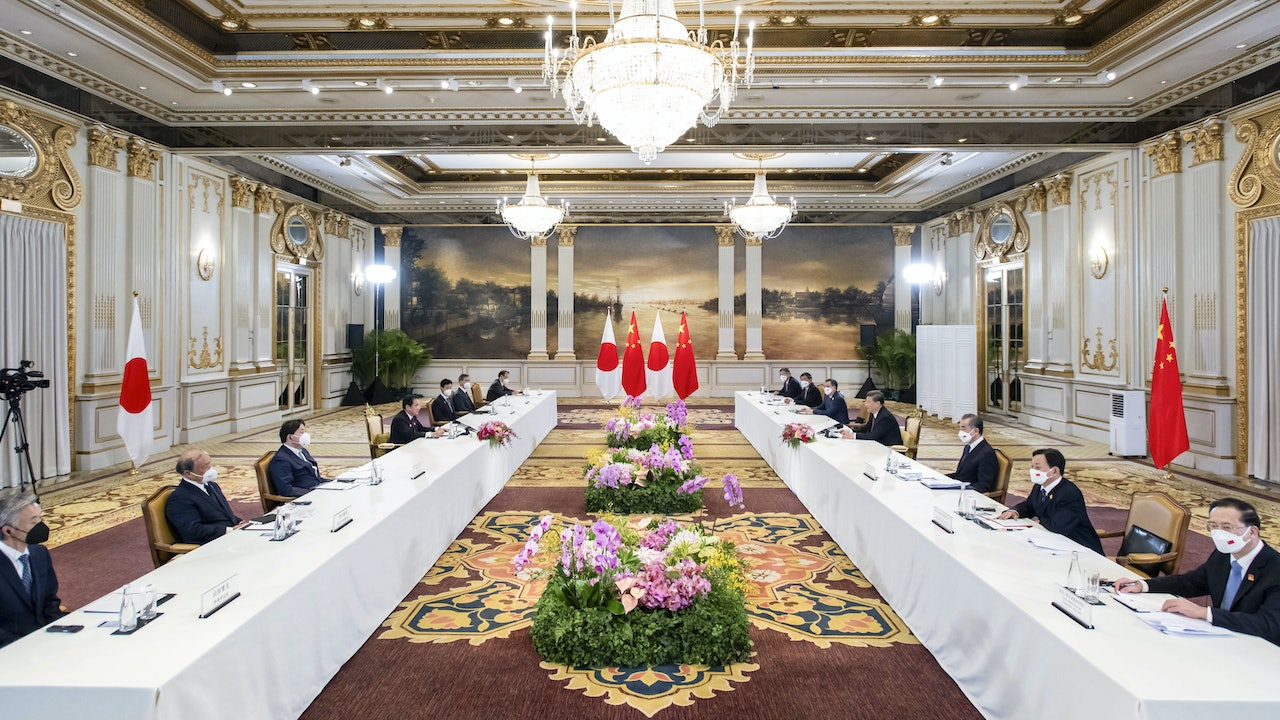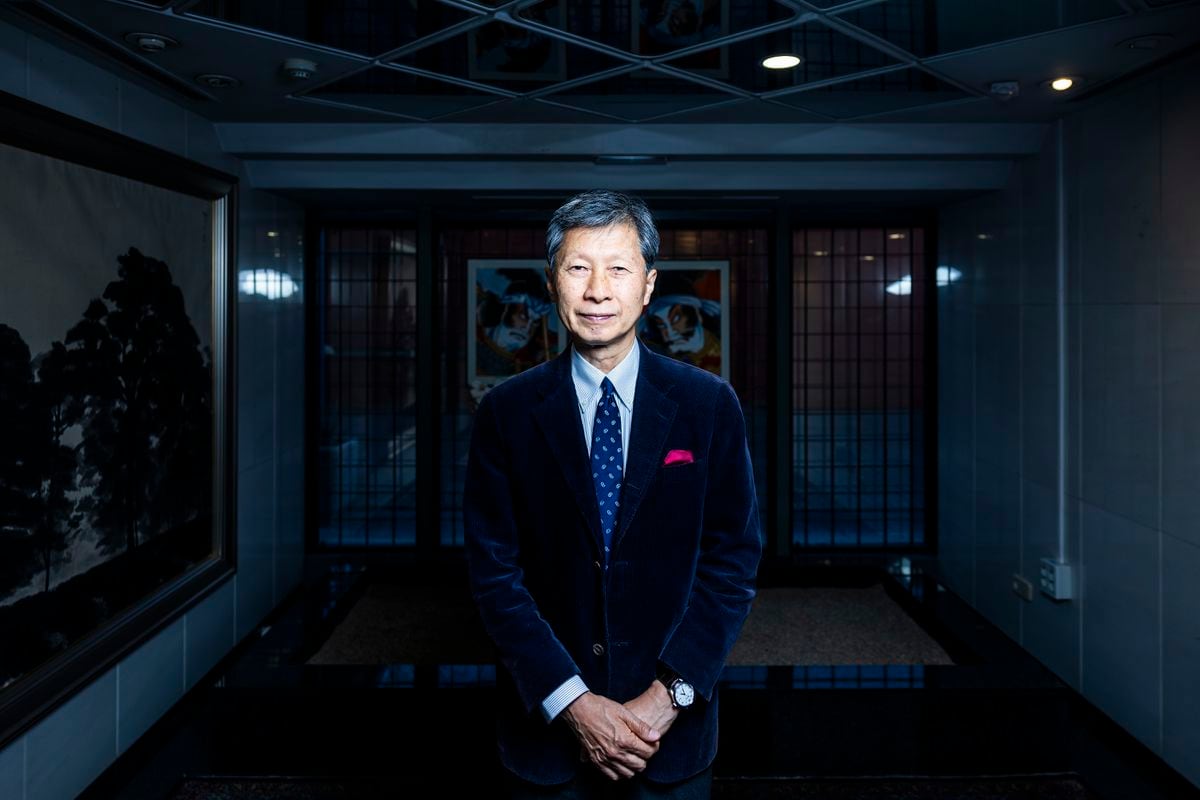2022 is the 50th anniversary of the resumption of diplomatic relations between China and Japan, but the relationship between the two countries this year has not been smooth.
After the outbreak of the Russo-Ukraine War on February 24, there was agitation for "rearmament" in the Japanese political arena. First, former Prime Minister Shinzo Abe proposed "nuclear sharing" with the United States on February 28, and then the current Prime Minister Fumio Kishida announced on March On March 13, it was proposed that the Japanese Constitution should be amended and the Japanese Self-Defense Forces should be formally included in Article 9 of the Constitution, which aroused criticism from surrounding countries including China.
On July 8, former Japanese Prime Minister Shinzo Abe was assassinated and died. Fumio Kishida publicly stated that he would inherit Abe's will and work hard to complete the constitutional amendment.
On July 10, the results of the general election for the Japanese Senate were released. The constitutional amendment forces represented by the Liberal Democratic Party, the Komeito Party, the Japan Restoration Society, and the National Democratic Party reached two-thirds of the seats required for constitutional amendment motions.
On August 5, the outgoing Speaker of the U.S. House of Representatives Nancy Pelosi (Nancy Pelosi) went to Japan after her visit to Taiwan. Fumio Kishida said during the meeting between the two, "In order to maintain peace and stability across the Taiwan Strait, the U.S. and Japan will cooperate closely." It can be said that it echoed Abe’s continuous statement after leaving office that “what’s wrong with Taiwan is what’s wrong with Japan, that is, what’s wrong with the Japan-US alliance.”
On September 27, Shinzo Abe's state funeral was held.
(Reuters)
On October 3, Kishida delivered a policy speech at the 210th Provisional Diet of Japan, stating that in order to deal with China and North Korea, it is necessary to thoroughly strengthen Japan's defense within five years, including "counterattack capabilities (attack capabilities against enemy bases)" Discussions will be carried out on matters including , and three documents related to security will be revised.
On November 17, Chinese President Xi Jinping arrived in Bangkok, Thailand, preparing to attend the 29th APEC Economic Leaders' Meeting, and met Fumio Kishida on the same day. This was the first offline meeting between the Japanese Prime Minister and the Chinese President in the past three years. The meeting is of great significance, but it is still difficult to prevent the downward trend of Sino-Japanese relations.
On December 16, the Japanese government adopted the new version of "National Security Strategy", "National Defense Strategy", and "Defense Force Preparation Plan" (referred to as the "Three Security Documents"), positioning China as "the biggest strategic challenge so far", and proposed that Japan It will be committed to having the ability to attack the enemy, and will greatly increase military expenditures in the next five years.
This action means that Japan has gradually deviated from the principle of "exclusive defense" and seriously cast dust on the peaceful concept of the post-war constitution.
From the Sino-Japanese friction in 2022, it can be seen that Japan's foreign policy is undergoing a transformation: its security strategy is gradually turning from defense to offense, and the trend of US-Japan interference in the Taiwan Strait is also taking shape.
In the process, the mutual trust foundation of Sino-Japanese relations is constantly being hollowed out.
On May 24, 2022, U.S. President Joe Biden (left) and Japanese Prime Minister Fumio Kishida (right) attended an event in Tokyo, Japan.
(Getty)
Internal affairs intensify strategic transformation
On the one hand, Japan's strategic transformation in 2022 will be accelerated, driven by the domestic political and economic situation.
First, former Prime Minister Shinzo Abe was assassinated and killed. This incident had a profound impact on the power structure and factional displacement of the Liberal Democratic Party, and to a certain extent provided political energy for constitutional revision forces.
On July 9, the day after Abe’s death, the Japanese Senate held elections. The support of the Liberal Democratic Party rose by 4 percentage points compared with the past, and the constitutional revision forces also broke through two-thirds of the seats. .
Fumio Kishida also said at the post-election press conference that the Liberal Democratic Party's victory in the Senate election will allow it to promote domestic and foreign policies without any worries. "Constitutional amendments are also included in these policies."
The second is the sluggish support of the Kishida government since November. As a result, Fumio Kishida has to show a strong posture in the fields of security policy and constitutional revision to consolidate support within the party.
After Abe's assassination ignited the storm of public opinion that "the Unification Church infiltrated the Liberal Democratic Party", Fumio Kishida announced the reshuffle of the cabinet in August, but was immediately kicked out in October. Being able to announce his resignation on October 24 impacted Kishida's political prestige; then the Minister of Justice Yasuhiro Hari, the Minister of General Affairs Minoru Terada, and the Minister of Reconstruction Akiba Kenya also resigned due to scandals. The first two were members of the Koikekai led by Kishida. The prime minister himself obviously could not have escaped unscathed.
According to the results of several public opinion surveys released by Japanese media, the support rate of the Kishida cabinet has been declining since November. Taking the results of the polls of Japan’s NHK TV station as an example, its support rate is only 33%. This is the sixth time since June 23 this year that this entry has been posted on the hot topic of Twitter in Japan; the results of polls conducted by Japan's "Mainichi Shimbun" on November 19 and 20 show that there are 43% of the people "hope Kishida resigns as soon as possible"; many Japanese media even predict that several ministers Kono Taro and Liberal Democratic Party Secretary Toshimitsu Motegi are strong competitors of Kishida, and may seek to become the next president of the Liberal Democratic Party and Prime Minister of Japan .
Japan's digital minister Kono Taro.
(Getty)
Third, Japan's economic difficulties are difficult to solve in the short term, leading Kishida to choose to make a big fuss in the field of constitutional revision and security, hoping to save the unified local elections next spring.
A closer look at Japan’s current economic predicament shows that, in addition to being weak and unable to recover immediately after the epidemic, external events have also played a role: the Russian-Ukrainian war since February has detonated a global energy crisis, oil and food prices have soared all the way, and the Federal Reserve has even since 3 The consecutive interest rate hikes since January have led to a widening of the interest rate gap between Japan and the United States and a sharp depreciation of the yen.
Today's Kishida government is in a dilemma.
If the quantitative easing and negative interest rate policies are abandoned, it may lead to an increase in government debt risks, a sharp drop in bond market prices, and stock market volatility. Therefore, from September to October, the Japanese government conducted two market interventions, as well as the first exchange rate intervention since 1998.
However, the depreciation of the yen triggered imported inflation and dragged down the economic recovery. The implementation of the "new capitalism" economic policy announced by the Kishida government in May could only be delayed.
To some extent, the epidemic has exacerbated the widening gap between the rich and the poor that occurred during the Abe period. Although "new capitalism" is intended to alleviate the above-mentioned ailments, it can only restrain itself under the shackles of weak economic recovery. After all The first prerequisite for fair distribution is still economic growth.
To sum up, the assassination of Abe created an atmosphere for Kishida to promote constitutional revision, while the low support and economic difficulties made Kishida more motivated to "make a big break" in the security field to ensure the stability of the throne of power.
Japanese Prime Minister Fumio Kishida announced on December 26, 2022 that he would replace Kenya Akiba (pictured), Minister of Reconstruction who was involved in a political donation scandal.
This is the fourth minister to step down from the Kishida Cabinet since October 2022.
(Akiba Kenya Facebook page)
China is targeted
On the other hand, the international situation has also promoted Japan's strategic transformation, making it gradually regard China as a target and a reason to "unseal it".
The first is the expectation of public opinion induced by the Russia-Ukraine war.
With the spread of the war in Ukraine, the awareness of security autonomy in Japanese society has risen, and its government has directly linked the narrative of the conflict between Russia and Ukraine with the Taiwan Strait, strengthening the shaping of hostility towards China.
Take the new version of the "Blue Book of Diplomacy" released by Japan in April as an example, which states that "emerging and developing countries represented by China have accumulated strength through globalization" and "the world has officially entered the era of Sino-US competition, and the international order is facing severe challenges." ".
The "Three Security Documents" revised at the end of 2022 are even more obvious.
For example, the "National Security Strategy" emphasized that in recent years, "Japan is in the most severe and complex security environment after the war, and the pressure to unilaterally change the status quo through force is rising." "As a major member of the international community, Japan will cooperate with its allies and Like-minded countries cooperate to achieve a new balance in international relations, especially in the Indo-Pacific region", "Peace and stability in the Taiwan Strait is an indispensable element"; other documents also mentioned that China and Russia have carried out joint exercises and other cooperation around Japan, " It is a strong concern for Japan's security."
On December 16, Japanese Prime Minister Fumio Kishida explained the revision of the three security documents at a press conference, focusing on responding to Japan's strategic situation in the new era.
(Reuters)
Second, the strengthening of the Japan-US alliance is also key.
From a historical perspective, the "US-Japan security system" left over from the resumption of diplomatic relations between China and Japan in 1972 originally provided a strategic gap for Japan to intervene in the Taiwan Strait. Now the international trend of Sino-US competition has made Japan's rise to "borrow" "Pro-US and Far-China" has the ambition to return to the stage of great power.
According to Japanese media reports, Fumio Kishida is expected to visit the U.S. in January 2023. At that time, he will agree with Joe Biden to revise the "Guidelines for Japan-U.S. Defense Cooperation" to change the long-standing situation that Japan is the "shield" and the United States is the "spear." , Gradually lift the ban on Japan's attacking ability as a "spear".
However, in all fairness, although Japan frequently mentions "something is happening in the Taiwan Strait" and is cooperating with the United States to use the security system to interfere in the Taiwan Strait conflict, it does not intend to actually intervene in the Taiwan Strait conflict by force; its real intention is to exaggerate the China threat theory, Linking "matters in the Taiwan Strait" with "matters in Japan" increases the legitimacy of military expansion and breaks through the institutional constraints of the post-war constitution.
Taking the "Three Security Documents" as an example, the new version of the "National Security Strategy" declares that Japan should have "counterattack capabilities", that is, "the ability to attack enemy bases." Therefore, it will purchase and equip a large number of American "Tomahawks" in the next five years. "Type cruise missiles and domestically improved "Type 12" shore-to-ship missiles with a range of more than 1,000 kilometers, etc., will also develop high-speed glide bombs and hypersonic missiles, which means that the principle of "dedicated defense" will be seriously hollowed out.
The picture shows the situation of the newly-built Aegis destroyer of the Japan Maritime Self-Defense Force conducting a ballistic missile interception test in the Pacific Ocean around Hawaii on November 16 or 19, 2022.
(Japan Maritime Self-Defense Force Twitter)
In addition, the "Security Level 3" sets the total Japanese defense expenditure from 2023 to 2027 at about 43 trillion yen, which is nearly 1.6 of the total of about 27 trillion yen in the current "Medium-Term Defense Force Preparation Plan" (2019-2023). times, and stipulated that in 2027, the goal of defense spending accounting for 2% of the gross domestic product (GDP) should be achieved. Given that Japan has followed the standard of no more than 1% of this ratio before, public opinion is more generally regarded as whether Japan pursues An indicator of pacifism, this move is undoubtedly a major subversion of the post-war constitutional concept of peace.
In short, troubles in the Taiwan Strait and threats from China are the basis for Japan's current propaganda to promote military expansion. However, although Japan may not intend to "help defend Taiwan", Sino-Japanese relations will definitely suffer as a result.
First, Japan’s substantial military expansion and militarization of the southwestern islands will inevitably lead to regional tensions; second, Japan has repeatedly hinted that “whatever happens in the Taiwan Strait is what happens to Japan,” which has actually violated the basic principles of the four political documents between China and Japan.
Judging from Kishida's visit to the United States in January and the revision of the "Japan-US Defense Cooperation Guidelines", Japan's strategic transformation will be difficult in the short term, and Sino-Japanese relations in 2023 may also have constant friction.
Which Japanese political and economic events or phenomena have prompted Fumio Kishida to make drastic changes in security and constitutional revision?
Shinzo Abe was assassinated, Fumio Kishida's support was sluggish, and Japan's economy was hard to pick up.
How will the international situation in 2022 affect Sino-Japanese relations?
The outbreak of the Russo-Ukraine War and the closer Japan-US alliance have made Japan increasingly assertive of the China threat theory and troubles in the Taiwan Strait, hoping to break through the shackles of the post-war pacifist constitution and achieve military expansion.
North Korea’s missiles scaring off Japan’s alarm is a deterrent and collision with the United States. “National normalization.” Regardless of whether China is a “threat” or a “challenge,” Sino-Japanese relations are different from the past. Can Xi Jinping’s meeting with Fumio Kishida save the deteriorating Sino-Japanese relations?
Abe’s State Funeral and the 50th Anniversary of the Establishment of Diplomatic Relations Between China and Japan: The Era Game of Pacifism and Constitutional Amendment Forces











/cloudfront-eu-central-1.images.arcpublishing.com/prisa/KMEYMJKESBAZBE4MRBAM4TGHIQ.jpg)


